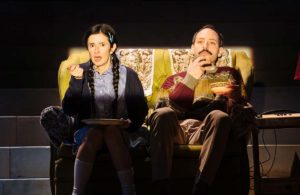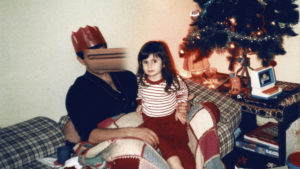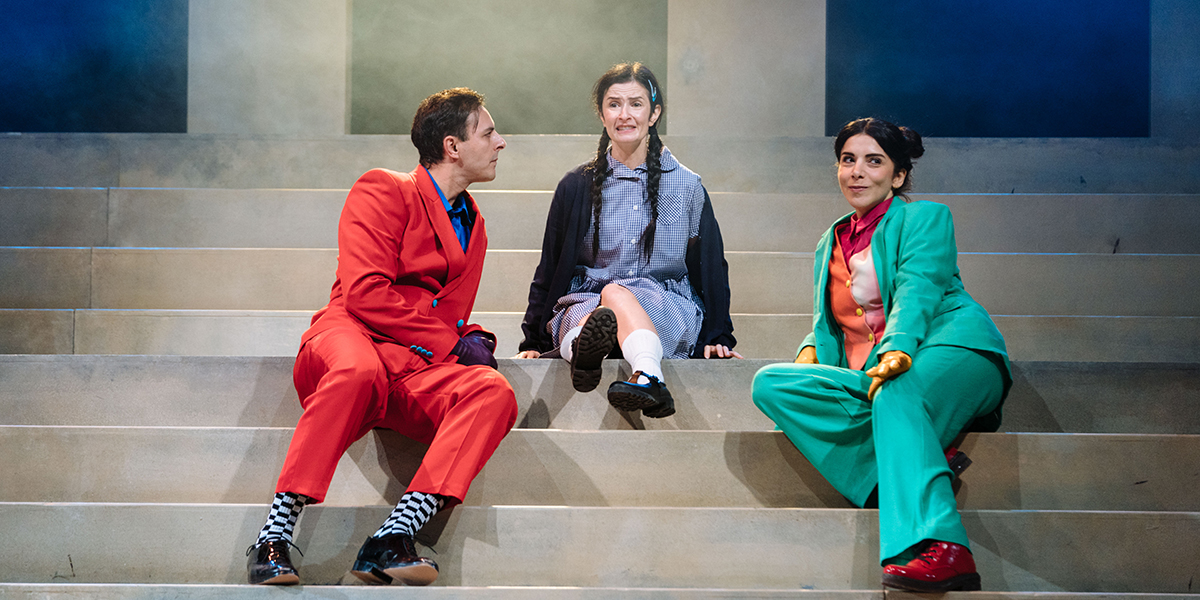Written by Jasmine Naziha Jones, a British-Iraqi actress, ‘Baghdaddy’ is playing at the Royal Court Theatre until mid-December 2022.
Review by Asma Ibrahim.

‘Baghdaddy’ is certainly not for the faint-hearted. It is explosive, dynamic, and unpredictable from the get-go. The play opens and ends in the familiar golden arches of McDonalds, and on both occasions Darlee (Jasmine Naziha Jones) and her father (Philip Arditti), celebrate her birthday. The young Anglo-Iraqi, Darlee, is regaled by her father’s impassioned stories of Iraq, and reminisces about the baklava and innumerable cousins with childish delight. However, this play is not a simple retelling of the past; its surrealist and absurdist elements make it an unnerving exploration of trauma and war. Clad in colourful suits, three spirits appear on stage with the purpose of opening the Pandora’s box that is Iraq in their own nefarious way.
In addition to the utterly brilliant title, ‘Baghdaddy’ has a lot to offer the viewer. The first half of the play is more light-hearted. Alongside Darlee, we see vignettes of her father’s life, including his first days in the UK, the various adventures with his somewhat illiterate Saudi friend, and then finally the series of wars that batter Iraq; the Iran-Iraq war, the Gulf War and finally the invasion of Iraq. Arditti’s brilliant performance moves the audience, particularly when he is depicted frantically attempting to help through his ‘one man aid drops’. Unpredictable, booming, and magnificent, the three clown-like spirits (Souad Faress, Hayat Kamille, and Noof Ousallem) traipse around the stage dancing, swearing and conducting the plot forward. Noof Ousallem, in particular, steals the show with an assortment of accents and great panache.
Up until this point, slapstick humour and absurdity tone down the dark themes of the narrative. However, towards the end, the stage is cleared for two searing monologues performed by Arditti and Jones respectfully. It is adult Darlee’s heartfelt speech about the damage caused by UN sanctions that suckerpunches the viewers; in fact, it brings some members of the audience to tears. These monologues feed into a message that diasporic Iraqis know well – a war taking place even three thousand, three hundred and twenty miles away can devastate a person and their family for years to come. By locating the play in England, the audience cannot shy away from what they see. Generational trauma is touched on by the panic attacks Darlee develops, and the well-intentioned but patronising English philanthropists that speak to Darlee exemplify an exaggerated lack of sensitivity and unwillingness to listen.
I must admit that at times the play was not quite as cohesive as it could have been, and may have benefitted from cutting a few scenes. In addition, for a play that focuses on a dual heritage character, there is, surprisingly, no mention at all of Darlee’s mother. Nonetheless, there is a clear sense of personal connection and raw emotion imbued in ‘Baghdaddy’. While its anti-Western sentiment is on the nose, one cannot deny its truths. All in all, ‘Baghdaddy’ is a stunning debut, and a play to remember.

Tickets were offered for free from the Royal Court Theatre.

